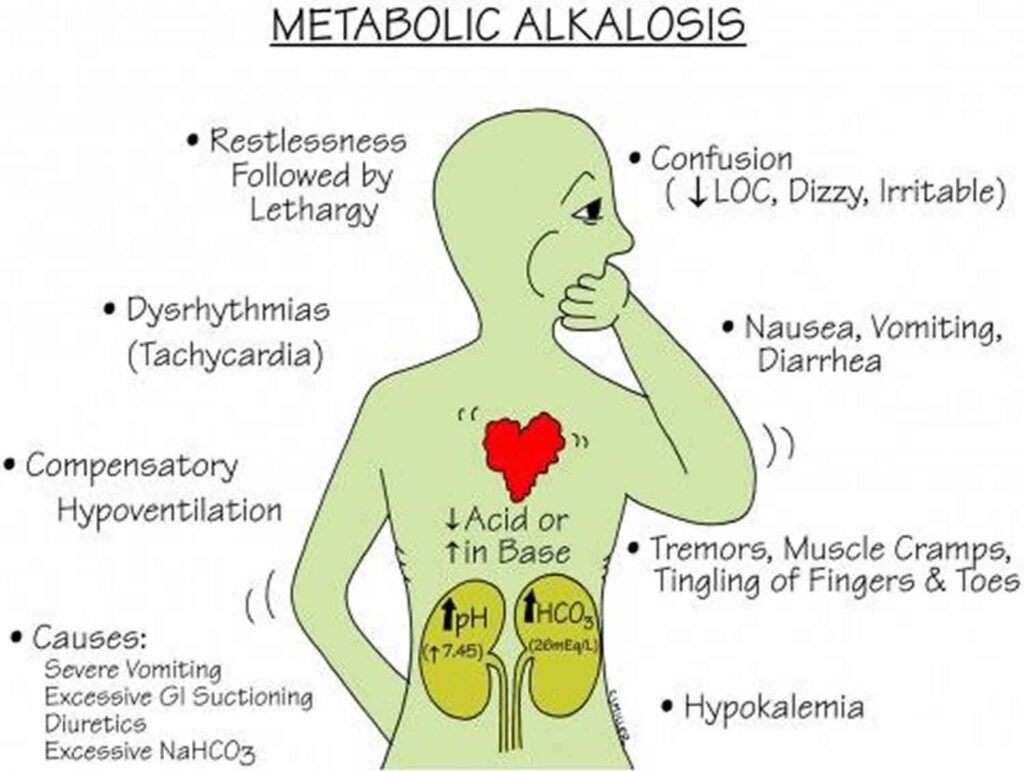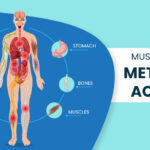Metabolic alkalosis is a medical condition characterized by an elevated pH in body fluids due to excessive bicarbonate accumulation or hydrogen ion loss. It disrupts the body’s acid-base balance, leading to significant physiological changes. If left untreated, it may result in severe complications, affecting vital organs and overall metabolic functions.

Causes of Metabolic Alkalosis
Metabolic alkalosis occurs due to a variety of reasons, including excessive bicarbonate retention or loss of acidic fluids. The primary causes include:
1. Vomiting and Gastric Suctioning
- Persistent vomiting leads to the loss of hydrochloric acid, which increases bicarbonate levels in the blood.
- Nasogastric suctioning in hospitalized patients can result in similar acid loss.
2. Diuretics
- Loop and thiazide diuretics cause increased sodium, potassium, and chloride loss, leading to bicarbonate retention.
- Overuse of diuretics is a common cause of metabolic alkalosis in patients with hypertension or heart disease.
3. Excessive Bicarbonate Intake
- Consumption of excessive antacids or sodium bicarbonate supplements can result in increased bicarbonate levels.
- Common in patients with peptic ulcers or acid reflux.
4. Hypokalemia (Low Potassium Levels)
- Potassium depletion forces hydrogen ions into cells, increasing extracellular bicarbonate concentration.
- Often seen in patients taking diuretics or those with chronic diarrhea.
5. Hyperaldosteronism
- Excess aldosterone causes sodium retention and hydrogen ion excretion, leading to alkalosis.
- Common in conditions like primary aldosteronism (Conn’s syndrome) and Cushing’s syndrome.
Symptoms of Metabolic Alkalosis
Metabolic alkalosis manifests in various ways depending on its severity. Common symptoms include:
- Neurological symptoms: Confusion, dizziness, muscle twitching, and lethargy.
- Cardiovascular symptoms: Arrhythmias, hypotension, and palpitations.
- Gastrointestinal symptoms: Nausea, vomiting, and bloating.
- Respiratory symptoms: Hypoventilation as the body tries to compensate by retaining carbon dioxide.
- Muscular symptoms: Muscle cramps, spasms, and weakness due to electrolyte imbalances.
Diagnosis of Metabolic Alkalosis
1. Blood Gas Analysis
- Measures arterial blood pH, bicarbonate (HCO3-), and partial pressure of carbon dioxide (PaCO2).
- pH above 7.45 and elevated bicarbonate levels indicate metabolic alkalosis.
2. Serum Electrolyte Tests
- Identifies potassium, sodium, and chloride imbalances.
- Low chloride and potassium levels suggest volume contraction alkalosis.
3. Urinary Chloride Levels
- Helps differentiate between chloride-responsive and chloride-resistant alkalosis.
- Low urine chloride (<10 mmol/L): Suggests volume depletion (e.g., vomiting, diuretics).
- High urine chloride (>20 mmol/L): Suggests conditions like hyperaldosteronism.
4. Hormonal Studies
- In cases of suspected hyperaldosteronism, plasma aldosterone and renin levels are evaluated.
5. Imaging Studies
- CT scans or MRIs may be needed to identify adrenal gland disorders causing excessive aldosterone production.
Treatment of Metabolic Alkalosis
1. Addressing the Underlying Cause
- Treating the primary disorder, such as stopping excessive vomiting or correcting diuretic use, is essential.
2. Fluid and Electrolyte Replacement
- IV Fluids: Normal saline (0.9% NaCl) replenishes chloride and sodium deficits.
- Potassium Supplementation: Restores potassium balance and prevents further alkalosis.
3. Medications
- Acetazolamide: A carbonic anhydrase inhibitor that promotes bicarbonate excretion in the kidneys.
- Spironolactone or Eplerenone: Aldosterone antagonists used in hyperaldosteronism cases.
4. Respiratory Compensation
- Patients may develop compensatory hypoventilation to retain CO2 and correct alkalosis.
5. Dialysis
- In severe cases, dialysis may be necessary for rapid correction, particularly in kidney failure patients.
Complications of Metabolic Alkalosis
If left untreated, metabolic alkalosis can lead to severe complications:
- Arrhythmias due to electrolyte imbalances.
- Neuromuscular dysfunction leading to muscle weakness or tetany.
- Reduced cerebral blood flow, causing confusion and lethargy.
- Respiratory failure due to hypoventilation and CO2 retention.
Prevention of Metabolic Alkalosis
- Monitor Diuretic Use: Avoid excessive diuretics or use potassium-sparing diuretics if necessary.
- Maintain a Balanced Diet: Ensure adequate potassium and chloride intake.
- Limit Antacid Use: Avoid excessive bicarbonate-containing antacids.
- Regular Medical Checkups: Patients with kidney or hormonal disorders should undergo periodic evaluations.
Metabolic alkalosis is a complex acid-base disorder that requires timely diagnosis and appropriate treatment. Understanding its causes, symptoms, and management strategies is crucial for preventing complications and ensuring optimal patient care. By addressing underlying conditions and maintaining proper electrolyte balance, the risk of metabolic alkalosis can be significantly reduced.

